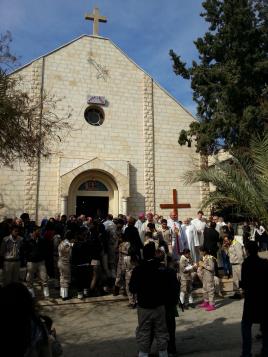
“Here we live day by day. We don’t think about the future, a future that could come only by miracle.” Father Mario Da Silva, parish priest of the Holy Family Church, the only Catholic church in the Gaza Strip, located in the area of al-Zeitun, the eastern neighbourhood that is also home to the Orthodox community, replied to the “usual” question arriving from the other end of the phone – “How is the situation there?” – with the words of his faithful. Since Hamas fundamentalist Islamic movement seized power ten years ago, causing the Israeli and Egyptian blockades, life in the Strip has become practically impossible.
 Old figures new emergencies. According to various bodies operating in the over-populated Gaza Strip, some 42% of Gazans are unemployed, 80% live on foreign aid, while 40% receive water only twice a week. Hygiene and health deficiencies add up to food insecurity situations and to the difficulties linked to the slow reconstruction that ensued the Israeli military campaigns, “Operation Cast Lead” in 2009 and “Protective Edge” in 2014 (a total of 3.500 victims, 800 of whom were children), whose signs are still visible on the ground in the form of heaps of rubble of what once were infrastructures, along with destroyed or damaged homes. Over the past days there has been another emergency due to the shortage of electricity supply, acting as a battlefield between Hamas and the Palestinian National Authority (PNA) – led by President Abu Mazen who controls the West Bank – with Israel, the power-supplying body, an interested spectator. In fact, in order to force Hamas to be removed from power in Gaza, Abu Mazen has decided to stop the payment of electricity Israel supplies to Gaza, thereby causing its shortage.
Old figures new emergencies. According to various bodies operating in the over-populated Gaza Strip, some 42% of Gazans are unemployed, 80% live on foreign aid, while 40% receive water only twice a week. Hygiene and health deficiencies add up to food insecurity situations and to the difficulties linked to the slow reconstruction that ensued the Israeli military campaigns, “Operation Cast Lead” in 2009 and “Protective Edge” in 2014 (a total of 3.500 victims, 800 of whom were children), whose signs are still visible on the ground in the form of heaps of rubble of what once were infrastructures, along with destroyed or damaged homes. Over the past days there has been another emergency due to the shortage of electricity supply, acting as a battlefield between Hamas and the Palestinian National Authority (PNA) – led by President Abu Mazen who controls the West Bank – with Israel, the power-supplying body, an interested spectator. In fact, in order to force Hamas to be removed from power in Gaza, Abu Mazen has decided to stop the payment of electricity Israel supplies to Gaza, thereby causing its shortage.
Today electricity in Gaza is supplied only for two and half hours instead of 8. The Palestinian President also cut the  wages of 70 thousand PNA employees by 30% and reduced funding to buy fuel for Gaza’s power station. A harsh denunciation comes from the head of the UN Palestine Refugee Relief Agency, Danish lawyer Bo Schack: “We are entering a new crisis situation. The salaries of Palestinian Authority employees in Gaza have been cut. A similar situation involves the supply of electricity along with the more tragic situation of water supply.”
wages of 70 thousand PNA employees by 30% and reduced funding to buy fuel for Gaza’s power station. A harsh denunciation comes from the head of the UN Palestine Refugee Relief Agency, Danish lawyer Bo Schack: “We are entering a new crisis situation. The salaries of Palestinian Authority employees in Gaza have been cut. A similar situation involves the supply of electricity along with the more tragic situation of water supply.”
The remains of a smile. “Thinking about the future in these living conditions is very hard, that’s why
It’s better to focus on the present and try to make it more liveable”,
Father Da Silva, at the lead of a community of 138 faithful in Gaza, told SIR. “I have recently updated the figures and we reached this number thanks to the six newborn of the past months”, he added, before pausing over the phone, as if reflecting on the future of these children. “Electricity feed has been significantly reduced – said the priest of Brazilian origin, member of the Institute of the Incarnate World (IVE) – from eight to two-and-a-half hours a day. Living conditions have worsened, it’s hard to live without light or electricity. We have no possibility to use air conditioning – temperatures in Gaza are very high during this period – and we can’t store food in the fridge.”
 The small Christian community (less than 1500, counting Catholics and Orthodox, on a population of two million Gazans), said the parish priest, “pays the heavy price of the cut in salaries and early pensions decided by Abu Mazen. Many of them are Christians. So while before they wished to leave, now their yearning has increased. The people in Gaza are very angry.”
The small Christian community (less than 1500, counting Catholics and Orthodox, on a population of two million Gazans), said the parish priest, “pays the heavy price of the cut in salaries and early pensions decided by Abu Mazen. Many of them are Christians. So while before they wished to leave, now their yearning has increased. The people in Gaza are very angry.”
The situation among the religious seems to be no better. “We can’t leave the Strip, and for us this is a big problem – he said with concern –
Israel has been denying entry permits for the past months.
Only as a result of pressure have we managed to obtain permits for some consecrated women. The permits were denied also to other religious personnel. Next week I will have to leave the Strip, but I don’t know whether I’ll be able to return. We shall wait and see whether Israel will renew the permits close to expiry dates. The Latin Patriarchate will intervene.” Thus amidst Palestinian rockets falling every now and then, and occasional Israeli air raids, life in Gaza goes on. With some smiles. “Schools are closed now. Our summer camp ended a few days ago (ongoing from June 1st), attended by approximately 200 children, boys and girls, Catholics and Orthodox, coordinated by 20 educators. Those were intense days with a host of activities – said Father Da Silvia – held inside our parish church. The daily program envisaged a morning gathering followed by Mass and breakfast. Then catechesis and recreational activities until lunchtime. In the afternoon children were involved in various workshops: music, dance, circus, plaster works and embroidery.
We spent beautiful days, during which the children had the opportunity to experience a normal life, which here in the Strip occurs very seldom.”
In fact, the people of Gaza live “day by day. Without thinking about their future; that future that could arrive only by miracle.”










